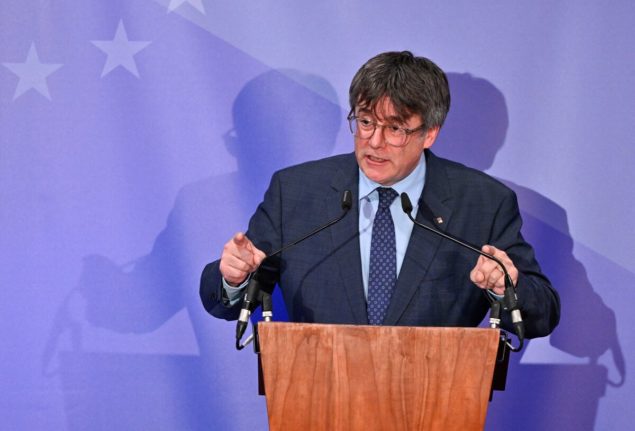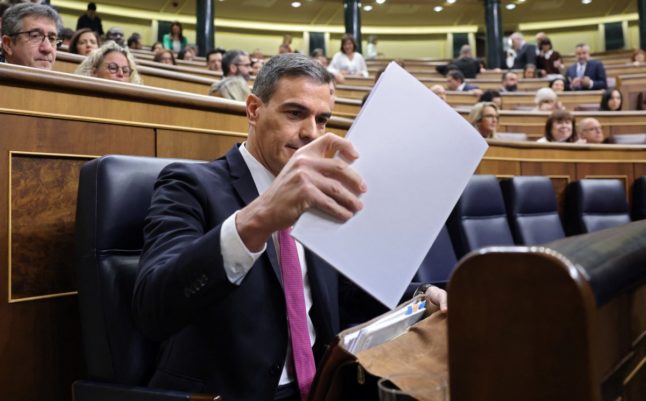Spain’s acting Socialist Prime Minister Pedro Sanchez’s bid to form a new government needs the backing of Catalan separatist leader Carles Puigdemont, who appears in no rush to strike a deal.
Puigdemont and his hardline Catalan separatist party JxCat emerged as kingmaker after an inconclusive general election in Spain in which neither the left nor the right won enough seats to form a governing majority.
In exchange for the key support of his seven JxCat lawmakers, Puigdemont is demanding an amnesty for hundreds of people who faced legal action over their roles in Catalonia’s failed push for independence in 2017, which sparked Spain’s worst political crisis in decades.
Among those who would benefit is Puigdemont, who headed the Catalan regional government in 2017 when it made a short lived declaration of independence after a violence-marred referendum banned by Madrid.
Puigdemont fled Spain shortly after to avoid prosecution and now lives in self-imposed exile in Belgium.
A deal on the amnesty seemed imminent on Thursday as Puigdemont met with top JxCat party officials at a hotel in Brussels.
A lectern with a microphone and a label with Puigdemont’s name on it was even set up but in the end he did not speak.
He instead urged “caution” even if “some are in a hurry” in what was seen as a reference to Sanchez.
If the Socialist leader fails to win an investiture vote in parliament by November 27, fresh elections will be held, most likely in mid-January.
‘Last minute differences’
The divisive amnesty proposal — which is fiercely opposed by the right — has already received the green light from Catalonia’s other main separatist party, the ERC which governs the wealthy northeastern region.
To seal this deal, the prime minister sent his right-hand man, cabinet minister Felix Bolanos, to Barcelona to meet with ERC officials.
Bolanos had reportedly hoped to celebrate a parallel agreement with Puigdemont’s party at the same time but instead he told reporters he “hoped” an agreement would “soon” be signed with JxCat.
Jaume Asens, a member of far-left party Podemos which governs in a coalition with Sanchez’s Socialists and who is negotiating a deal with JxCat, said “last minute differences” had emerged, without giving details.
But the “differences are so small” that not reaching a deal is “impossible”, he told Spanish public television, adding he was convinced that such an agreement would be reached “in the hours or days to come”.
‘Fierce fight’
Antonio Barroso, an analyst at political consultancy Teneo, said Puigdemont’s reluctance to sign an agreement with the Socialists is linked to the power struggle between his party and ERC in Catalonia, which has been governed by separatists for a decade and is slated to hold a regional election in 2025.
JxCat has been an opponent to Sanchez’s government in recent years after helping bring him to power in 2018 when it backed a vote of no confidence against his conservative predecessor Mariano Rajoy.
The more moderate ERC is open to dialogue with Madrid and has regularly helped Sanchez’s minority government to pass legislation in parliament.
“JxCat is caught up in a fierce fight with ERC for the dominance of the independence movement” and Puigdemont “does not want to be portrayed as someone who betrayed his own people” by agreeing to reappoint Sanchez to power, Barroso told AFP.
The ERC and JxCat governed Catalonia together at the time of the 2017 independence push but the two parties cut ties last year, with JxCat accusing ERC of weakness in its dealings with Spain’s central government. The ERC now governs Catalonia alone.
Puigdemont wants to “impose a narrative” about the agreement that is different than that of the ERC’s so “the last word must be his,” journalist Enric Juliana wrote Friday in Barcelona-based daily newspaper La Vanguardia.



 Please whitelist us to continue reading.
Please whitelist us to continue reading.
Member comments